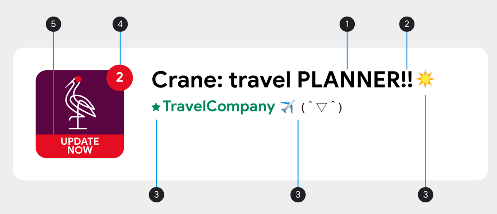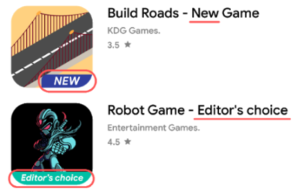As an app developer, it’s important to stay up-to-date with Google Play’s latest policy updates to ensure that your app remains in compliance with the platform’s rules and regulations. One such area that has undergone recent changes is metadata.
Metadata refers to the information that describes your app and helps potential users understand what it does and what they can expect from it. This includes the app title, description, screenshots, promotional videos, and other similar elements.
Table of Contents
- Metadata refers to the information that describes your app and helps potential users understand what it does and what they can expect from it. This includes the app title, description, screenshots, promotional videos, and other similar elements.
- Let’s take time to review what the Play Store views as deceptive and improper information so you can make sure your store listing content complies with Google’s new policy.
- YOU SHOULD AVOID:-
- ❌ Unattributed or anonymous user testimonials in the app’s description.
- ❌ Using emojis, emoticons, or repeated special characters in the app’s title, icon, and developer name.
- ❌ Misleading symbols in app icons.
- ❌ Text or image in the app title, icon, or developer name that indicates store performance or ranking (for example, ‘App of the year,’ ‘# 1,’ ‘Best of Play 20XX,’ ‘Popular,’ award icons, etc.)
- ❌ Text or image that indicates price or promotional information (for example, ‘10% off’’, $50 cash back,’ ‘free for a limited time only,’ etc.)
- ❌ Text or image that indicates Google Play programs (for example, ‘Editor’s choice’, ‘New’, etc.)
- Conclusion
Recent changes to Google’s metadata policy will take effect on May 31, 2023, according to the company. Users rely on your app’s descriptions to comprehend its functionality and purpose, as you are probably aware. As a result, it’s essential for the Google Play Store to maintain high levels of consumer satisfaction and filter out all deceptive metadata material.
Let’s take time to review what the Play Store views as deceptive and improper information so you can make sure your store listing content complies with Google’s new policy.
YOU SHOULD AVOID:-
❌ Unattributed or anonymous user testimonials in the app’s description.

② Data comparison of apps or brands.
③ Word blocks and vertical/horizontal word lists.
❌ Using emojis, emoticons, or repeated special characters in the app’s title, icon, and developer name.
❌ Misleading symbols in app icons.

② Special character sequences that are irrelevant to the app.
③ Use of emojis, emoticons(including kaomojis), and special characters.
④ Misleading symbol.
⑤ Misleading text.
❌ Text or image in the app title, icon, or developer name that indicates store performance or ranking (for example, ‘App of the year,’ ‘# 1,’ ‘Best of Play 20XX,’ ‘Popular,’ award icons, etc.)

❌ Text or image that indicates price or promotional information (for example, ‘10% off’’, $50 cash back,’ ‘free for a limited time only,’ etc.)

❌ Text or image that indicates Google Play programs (for example, ‘Editor’s choice’, ‘New’, etc.)

Keep in mind that you need to have a clear and well-written description of your app. This will help you stay on track and make sure that your app store listings are in compliance with Google guidelines.
If your app metadata includes any forbidden elements, take action now to avoid potential penalties from Google Play algorithms. It’s important to proactively address these issues and ensure compliance for the continued success of your app on the platform. 🚀
📌 More details about Google policy updates are here!
Conclusion
Understanding Google Play’s latest policy updates on metadata is essential for app developers who want to ensure that their apps remain in compliance with the platform’s rules and regulations. By providing clear and accurate metadata, avoiding spam and keyword stuffing, and avoiding misleading or inappropriate content, you can ensure that your app remains available on the Google Play store for users to discover and download.






